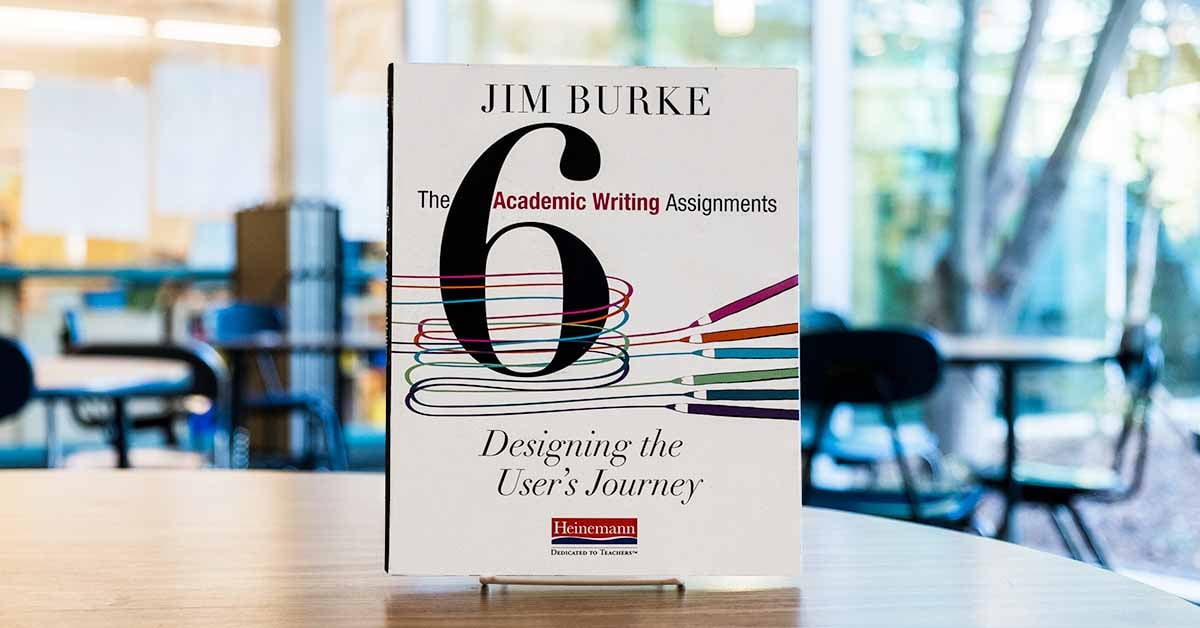 Traditional writing assignments have focused on the moves, traits, genres, or rhetorical situations of academic writing, especially those emphasized by various standards documents, which all prize argument above all other writing. Jim Burke, author of The Six Academic Writing Assignments, is offering a different view, one that does not treat each type as a discrete genre; rather, the six types of writing assignments represent the way we really work, the assignments we actually give, and what we can ask students to do within the constraints of time, class size, student needs, and available resources.
Traditional writing assignments have focused on the moves, traits, genres, or rhetorical situations of academic writing, especially those emphasized by various standards documents, which all prize argument above all other writing. Jim Burke, author of The Six Academic Writing Assignments, is offering a different view, one that does not treat each type as a discrete genre; rather, the six types of writing assignments represent the way we really work, the assignments we actually give, and what we can ask students to do within the constraints of time, class size, student needs, and available resources.



- Writing to Learn: Writing to learn (WTL) can be part of one’s writing process; however, it can also be used to make sense of what students read, view, or listen to. WTL is an informal type of writing often done in a notebook, while taking notes, or following the conventions of a specific discipline. WTL assignments tend to emphasize the thinking and content more than the style or quality of the writing.
- Short-Answer Writing: Short-answer (SA) assignments range from one sentence
to a paragraph. Though they appear on exams, they are also a constant on most
homework and in-class assignments. They tend to ask students to explain or identify; some SA writing assignments follow the says–means–matters (SMM) format or an abbreviated version of the claim–reasoning–evidence (CRE) format. Such assignments emphasize content over style or quality of the writing, though there are inevitable exceptions, especially in English classes. - Writing on Demand: Writing-on-demand (WOD) assignments are associated with essay exams used by teachers, districts, states, or agencies such as the College Board or ACT to assess students’ knowledge of or their ability to write for a certain purpose about a topic or text. In English classes, the quality of the writing should matter as much as the ideas and the content.
- Process Paper: Process papers are those writing assignments, whether long or short, that require students to draft and revise their work in response to feedback from various possible sources. It’s not so much a distinct type of writing assignment as it is an instructional approach to teaching writing. Process paper assignments emphasize the quality of the writing as well as the thinking and content.
- Research Paper or Report: Research papers or reports are rare but essential. They prepare students for the longer papers they will write in college. These assignments require students to investigate questions or problems in depth and then anchor their claims and observations in texts, evidence, and findings from
research. Such assignments emphasize the quality of the writing as well as the
thinking and content; some, however, may place more value on the thinking and
content if the assignment is designed to teach the conventions and moves of such writing through shorter forms or what are sometimes called “simulated research” assignments, which are similar to the AP language synthesis essay in that such assignments are often timed and the sources are provided. - Alternative Forms: Alternative forms share many moves and purposes with
traditional academic writing assignments but include such forms as multimedia
presentations or other digital forms or hybrids. Some alternative forms focus on
the demands of real-world writing, such as résumés, proposals, or business letters. The quality of the writing tends to matter as much as the content, especially if it is for an authentic audience.
More often than not, the six different assignments as described here are not stand-alone assignments but tend to prepare students for other larger and often more complex assignments to come. What begins, for example, as a writing-to-learn assignment done in class in students’ daybooks often lays the foundation for the short-answer paragraphs they will eventually write about a story they read and about which they’ll later write an on-demand paper that draws on those initial short-answer paragraphs, possibly morphing into a process paper they will revise if there is time and cause to treat the on-demand essay as a draft instead of a final destination.
• • •
Learn more about The Six Academic Writing Assignments at Heinemann.com
 Jim Burke is the author of numerous bestselling Heinemann titles, including the English Teacher’s Companion, Fourth Edition and What’s the Big Idea? The question he’s always tried to answer is “How can we teach our students better?” He seeks these answers daily through his work in his own classroom at Burlingame High School in California where he still teaches after twenty years. Facing the same constraints and challenges as every other teacher, Jim shares his creative solutions in bestselling professional titles with Heinemann such as Reading Reminders and Writing Reminders as well as through Heinemann Professional Development Services. As part of his commitment to helping teachers and learning how to use the latest technologies, he founded the English Companion Ning, described by Education Week as “the world’s largest English department” and winner of several Edublog Awards for Best Social Network for Education. In addition to the EC Ning, Jim offers a steady stream of recommended resources through his website (www.englishcompanion.com) and Twitter (@englishcomp) where he is ranked in the top 100 educators to follow at the top within the online English teacher community.
Jim Burke is the author of numerous bestselling Heinemann titles, including the English Teacher’s Companion, Fourth Edition and What’s the Big Idea? The question he’s always tried to answer is “How can we teach our students better?” He seeks these answers daily through his work in his own classroom at Burlingame High School in California where he still teaches after twenty years. Facing the same constraints and challenges as every other teacher, Jim shares his creative solutions in bestselling professional titles with Heinemann such as Reading Reminders and Writing Reminders as well as through Heinemann Professional Development Services. As part of his commitment to helping teachers and learning how to use the latest technologies, he founded the English Companion Ning, described by Education Week as “the world’s largest English department” and winner of several Edublog Awards for Best Social Network for Education. In addition to the EC Ning, Jim offers a steady stream of recommended resources through his website (www.englishcompanion.com) and Twitter (@englishcomp) where he is ranked in the top 100 educators to follow at the top within the online English teacher community.



